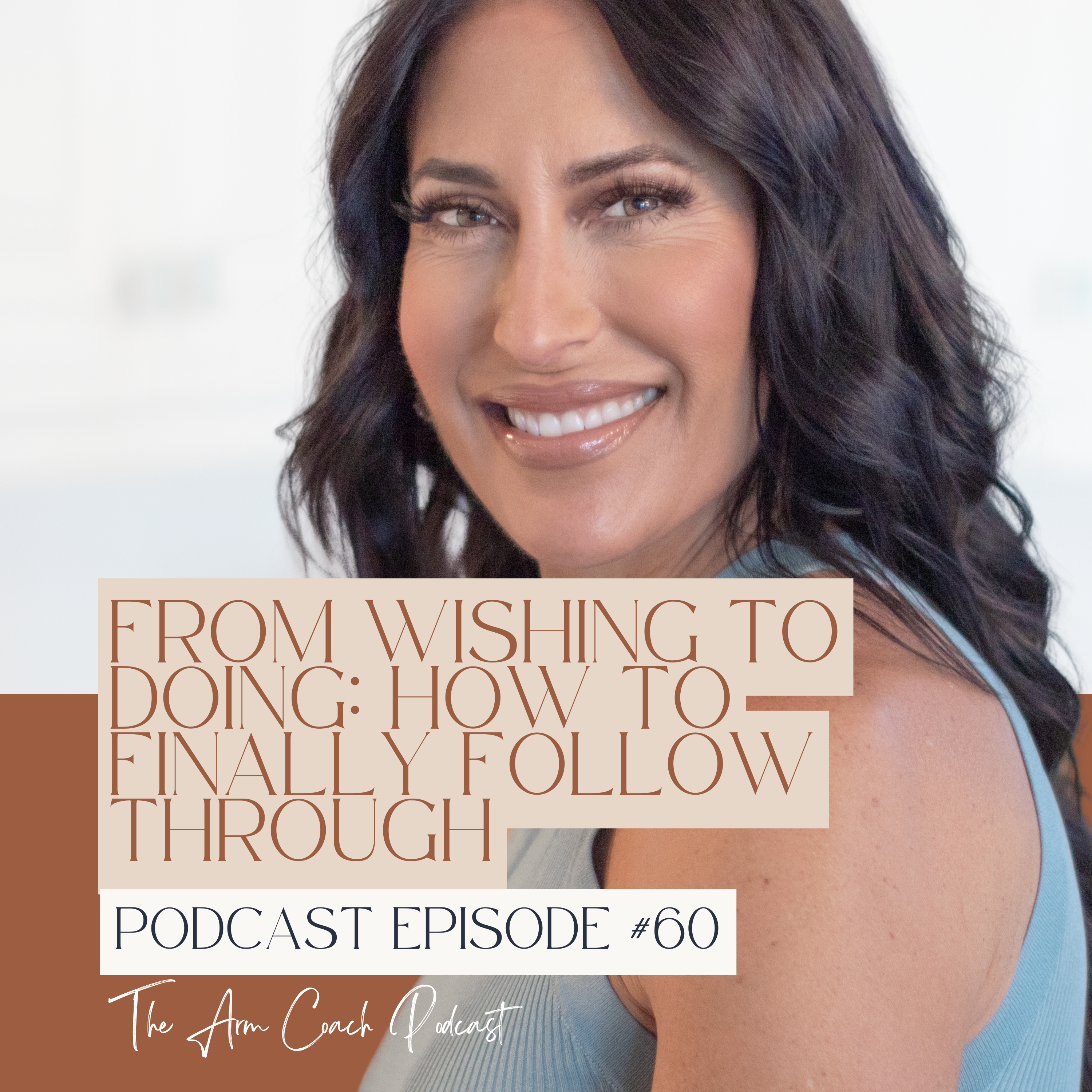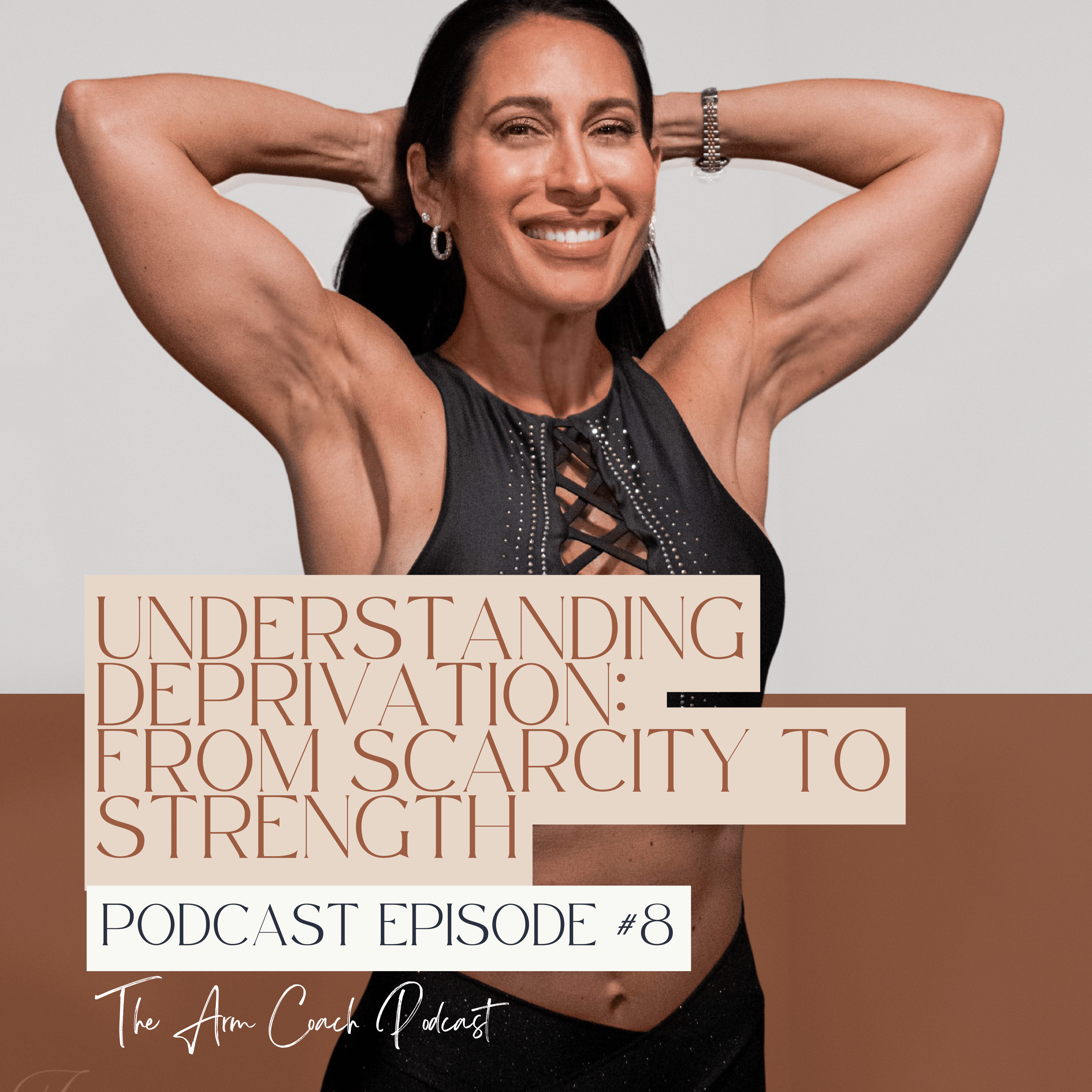Episode Transcript
Have you ever been on a
fitness plan or program
and had a slip? Skipped a
workout or eaten
something you wish you
hadn’t? Of course you
have! Why? Because
you’re human. Today is all
about slips and how to
minimize the damage to
your arm sculpting goals:
Learn exactly why you slip
from your plans, even
when it’s something you
really, really want.
Understand what key
things you tell yourself
that are guaranteed to
increase the damage from
your slip, and why you’re
conditioned to say them.
Then lets talk about a new
way to look at slips.
Hi, everybody, and welcome
to The Arm Coach podcast,
episode #23.
Today is all about how to
recover from a slip when
you’re sculpting your
arms or following any
fitness or nutrition plan.
Today I’m helping you
understand why you have
slips, we all do, recognize
what's happening when
it's happening, and learn
to recover faster than
ever before.
So I want to talk about
first, why we do have
slips if we're committed
to something, we make a
decision that we want to
sculpt our arms or learn
to do something different
or learn to eat differently,
and we're very
committed. We're very
excited. We're in that
honeymoon stage. Why
do we slip at all? Well the
fact is that every single
time we learn something
new, falling down is part
of the learning process.
Because we're forming
new pathways in our
brain. Our brain keeps
wanting to take us to
what it already knows. It’s
very efficient in having us
repeat our old behaviors.
And our old behaviors are
falling down, skipping
workouts, over eating,
doing things we don't
want to do, getting into
an emotional funk,
all those things that we
want to do less of, or stop
doing. And when we want
to add something in that's
new, we want to put a
new habit in there, or do
more of something that
doesn't come naturally to
us, that's when our brains
are tempted to keep
taking us down the old
path. So the way that our
brains are constructed,
the way that we've
evolved, kind of
guarantees that when we
try to do something new,
this is what's going to
happen. We're going to
fall down. So here's the
problem. Even though it's
expected, in science, we
tell ourselves that we
shouldn't fail, we
shouldn't have a problem,
we shouldn't have to fall
down. And when we do,
we think something's
wrong. We tell ourselves,
‘I failed. I just can't do
this’. And the good old
favorite one is, ‘well,
something must be wrong
with me’. And what
happens then is that we
create drama, where
there really is no purpose,
or no reason for it. And so
we make a small slip into
something much, much
bigger. The way we make
it bigger, is that typically
our next thoughts after
we slip off our plan or a
program is, ‘I may as well
keep going. I'm gonna be
good tomorrow. I need to
get as much as I can in
now, because this is my
last chance’. There’s an
old, old book by a diet
guru in New York. His
name is Steven Gullo G U
L L O, and he has a
theory that I love and still
use today. And it's called
the Slip to Sleep Theory.
And that is that the most
damage that comes from
slipping off your plan,
happens not from the slip.
Not from the skipped
workout or what you eat
when you deviate off
whatever your plan was.
But the damage comes
after the slip. Not that
slip. The damage comes
between the slip and the
end of the day when you
finally go to bed. So let's
say that you're choosing
to eat like a naturally fit
person, and you're going
to eat when you're a little
hungry, and you're going
to stop when you're a
little full. But your brain is
in the habit of being
emotional. And when
something comes up
that's uncomfortable to
you, you are in the habit
of eating to get your mind
off whatever is
uncomfortable. So when
you do that, when you
slip into the old habit of
eating emotionally, you're
going to eat something
that you didn't plan or is
more than your body
needs, right? You’re not
really hungry but you're
eating anyway. You're
eating beyond
comfortably full. It's what
you say to yourself after
you eat that, that leads to
much more destructive
behavior as far as your
plan goes. It's what you
eat until you go to bed.
That's what does the
damage, not the slip. So
here's what you say to
yourself, that leads you to
eat more and keep going.
You might say ‘I blew it, I
may as well start
tomorrow’. You might say,
‘I should just keep going,
I'm going to wait for
Monday. I'm going to wait
for next month. I'm just
going to wait till after the
kids go back to school’.
Or ‘I'm going to wait until
I finish this project at
work’. I'm sure some
version of this sounds
familiar to you. So here's
the thing. Our goal is not
to walk on eggshells and
try to forever prevent
having a slip. Because
slips are important. When
we make a slip, if we
have the right mindset,
we could look at it as
failing forward. Because
we're learning. We're
seeing what we still need
to work on. When we
make a mistake, getting
back up and learning is a
skill that we all need to
develop. No one gets it
right the first time, but
somehow you may
expect yourself to be the
exception, and do it
perfectly right from the
beginning. That's what
creates disappointment.
What you need to do is to
tell yourself that when you
slip, very, very simply, ‘I
made an error. I did this
because it's just the way
I've trained my brain. I've
done this so many times,
naturally my tendency is
to keep doing what I've
always done. Nothing is
wrong here. This is just
my habit’. And then ask
yourself, how can you be
more aware of this
tendency that you have.
So next time you catch
yourself a little faster. And
hopefully you stop a little
sooner. So ask yourself
when you slip, how can
you have compassion for
yourself? Because hating
yourself for slipping and
beating yourself up, only
serves to make you feel
worse. And then guess
what, then you want to
escape that new negative
feeling, and you want to
keep on watching tv or
eating. Of course you do.
Right? Of course you do.
That's what you're
creating.
So, what would you tell
yourself if you slipped,
but you were not you. You
were a dear friend of
yours. You would say
something like ‘you're
fine, don't worry’, you're
definitely going to get this
because, remember our
big motto here, if anyone
in the world could change
their habits and get up
after a slip, you can too.
Remember this. Failure is
not falling down. Failure is
staying down. So after
you've had a slip, what
can you do to get back
on track?
Well, number one, I want
you to think about
developing a regrouping
mentality, where you
literally make plans ahead
of time for how you will
get back up. Think about
how and what you want
to do and eat, as you're
regrouping. Do not allow
yourself to call yourself
bad names and be mean.
And absolutely no giving
up, not in the program
here. Make a very, very,
very, simple plan of self
care, and take a little time
for quiet reflection. When
you want to take a look at
what happened, and how,
and what you’d like to be
different next time, you
need to make some time
and space to think about
it. Otherwise your brains
gonna again, go right into
default mode, and most
likely you will keep eating
and putting off workouts.
So, number two, after
you've had a slip and you
want to get back on
track, number two, make
a U turn. As soon as you
recognize your error,
pause. There’s no need to
look at the calendar and
pick a new start date.
And don't tell yourself
‘well now I've got to start
all the way at the
beginning. I've undone all
the good that I've done’.
That is just simply not
true. You're never starting
from the beginning. You
can't erase what you
already know, what you
already saw, and realized,
and did. You just need to
make a U turn. Imagine
that you're driving your
car and your Google
Maps app is telling you
that you were off course.
I'm sure that's happened
to you. That nagging
voice is going to try to
correct you and get you
back on track. That's
what you need to do.
That voice from the
Google app is going to
keep saying, ‘make a U
turn, make a U turn, turn
left at the light’. That's
what you need to tell
yourself. All is not lost at
all, but you want to get
back on track. There's no
judgment needed. We
don't need to get upset
when we get lost driving.
We just make a
correction. So make a U
turn literally right now.
Not later, not in the future.
You made a mistake, so
just own it, no drama, and
get back on the road in
the right direction.
So number three, for what
we want to do when
we’ve had a slip, and
we're getting back on
track, I want you to
isolate the mistake. I do
not want you to
generalize and tell
yourself that everything is
wrong. You totally failed.
Nothing's going right.
When you make a
mistake, you want to stay
focused on exactly what
went wrong. See exactly
what the mistake was, so
you can figure out the
remedy. If you tell yourself
‘it's over, you failed,
nothing works’, then you
take yourself out of
problem solving mode,
and you're right smack in
suffering mode. And if
you're an emotional eater
let’s say, suffering mode
is exactly what's going to
take you back to
overeating again. So I
want you to make some
ground rules for yourself.
And the biggest one is No
Judging. Just as you
wouldn't judge a friend
who stumbled or fell
down, guilt and shame do
not make you do better.
Compassion actually
helps you get back your
self control. Guilt and
shame actually cause you
to continue struggling.
Falling down doesn't
mean everything's wrong.
Falling down doesn't
mean you were weak, or
lazy, or have no
discipline. It means you
did one specific thing that
took you off track. Focus
on that one specific thing.
So falling down does not
mean that you're weak or
you're lazy, or you have
no discipline. When you
create guilt and shame
and blame when you slip
off your plan, the thing
that we use to feel better
is, our procrastination or
overeating habit. And this
creates an even deeper
problem for you. And then
we indulge in
procrastination or
overeating even more. So
it's a case of doing
something to feel better
that actually makes our
problem worse. So isolate
the mistake. Do not
generalize.
Number four, the way to
get back on track after
you've had a slip. I want
to talk a little bit about
some ideas that I've read
from Gretchen Rubin,
who writes books on
habits and she has a
book called, Better Than
Before, Mastering The
Habits of our Everyday
Lives. She has a whole
chapter in that book
about how a stumble may
prevent a fall. And how
we have to get used to
being able to accept
small mistakes that we
make and continue. She
talks about something
that I'll bet you
instinctively know, and
that is, that habits are
tough to make and break,
but habits are also at the
same time, very fragile.
So you have to protect
the habits that you want
to keep, and the new
ones that you're making.
We're always going to be
exposed to temptation,
that's just part of life. And
the first thing we want to
do is be able to recognize
that we have temptation.
So we know that it's
possible that we might
have a slip. And
sometimes we can avoid
a cue for temptation. But
we might not avoid
everything. We can’t
avoid every social event,
right? We can’t and don't
want to avoid every party.
We can’t avoid a full
refrigerator. Or a hard day
at work. Or a certain time
of day or a certain
person. So it's not about
avoiding every possible
temptation or opportunity
where you might fail. But
just to know how to deal
with it when it happens
without giving up. And
know that it's natural.
And step number five for
recovering from a slip
from whatever kind of
program you've been on,
and that is that ‘if, then’
planning tool. And this
comes from habit
formation psychology,
which I know I've spoken
about before. And what it
means simply, is that you
have a plan in place. And
the plan is an ‘if, then’
plan. Which means, if this
happens, then I will do
that. It’s something that
you need to think about
ahead of time for
something that you
anticipate coming up. It
may not be exactly what
happens. But if you have
a general plan in place,
you're going to plant this
idea in your mind of how
you will handle it. So, not
just situations to avoid
skipping workouts or
overeating, but also, and
especially, for the times
when you do give in and
you skip your workout or
overeat. You definitely
will. So I want you to plan
for those times too. So for
example, If I overeat,
‘blank’, then I will ‘blank’.
When you're at a party, or
you're out socially, and
you're facing a lot of
delicious food and you're
not hungry, these are
situations when you're
going to be more likely to
give in to the old
pathways of your brain.
So I want you to use the
‘if, then’ technique to be
ready to make a plan, so
that if you do give in.... if
you can avoid it, Great.
And that would be, ‘if I'm
faced with pizza in the
office and everyone's
eating it, then I will order
a salad and have the
topping off one slice’. You
have a plan, or whatever
your situation is. But even
if you do give in, and do
eat when you're not
hungry, or do eat beyond
comfortably full, you still
can use the ‘if, then’
planning for what you're
going to do then. So you
don't lapse into the slip
that lasts until you go to
bed. Which you know
quadruples the damage
that you would do if you
just over ate a little bit.
Which wouldn't be a big
deal. So make a plan then
for, ‘if I do overeat at the
office party today, then I
will have a lighter supper
and wait until I'm hungry
to eat again’. ‘If, then', if
this happens, then I will
do blank. If I do this, then
I will compensate by
doing that. So one of the
things Gretchen says in
her book that I love is, in
fact a stumble may be
helpful, because it shows
me where I need to
concentrate my efforts in
order to do better next
time. So you may think
that if you plan to fall
down, that you're subtly
giving yourself permission
to do exactly that. I have
heard my clients say that.
That it's like a sneaky
little way to endorse
falling down, and giving in
and skipping the
workouts and eating
whatever they want in
that moment. This is
definitely not what we're
talking about here. Of
course, your goal is
always going to still be to
stay on track with your
arm sculpting plan. That's
your goal. To lift weights 3
days a week and to still
eat when you're hungry,
and to still stop when
your body's had enough.
But being human, there
are definitely going to be
times that you will
stumble. And how you
deal with that stumble,
that's what's going to
determine your long term
success. The stumble
itself does not determine
whether you reach your
goals or not. And I believe
that it’s foolish to expect
that you won't stumble.
Once you have strong
habits in place, and you
also create a plan for
picking yourself up from a
fall, then you can plan
variations in your plan.
Then you can make
exceptions to your plan.
And even those
exceptions, we usually do
better with them when we
decide in advance. These
strategies can help us do
what we need to do most
when we slip off our arm
sculpting plan, which is
get back up without
giving up, or doing further
damage. Remember, its
guaranteed that when you
learn something new,
you're going to fall down.
Guaranteed. It's only a fail
if you stay down. So keep
getting up and keep
learning. And never give
up.
I hope that this was
helpful to you today. I will
be back with another
coaching session for you
next week. I really
appreciate all of you who
are regular listeners. I love
being here for you and I
will continue to come
back every week, and
give you everything I have
in my private programs,
little by little. If you have
any questions for me or
there's anything that
you'd love to hear me talk
about, leave them in the
comments. Alright
beautiful! That's it for
now.


